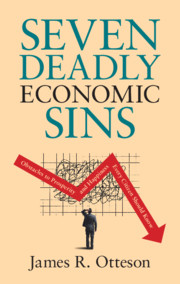Book contents
- Seven Deadly Economic Sins
- Seven Deadly Economic Sins
- Copyright page
- Dedication
- Contents
- Preface
- Introduction
- 1 Wealth Is Positive-Sum
- 2 Good Is Not Good Enough
- 3 There Is No Great Mind
- 4 Progress Is Not Inevitable
- 5 Economics and/or Morality
- 6 Equality of What?
- 7 Markets Are Not Perfect
- Conclusion
- Postscript
- References and Further Reading
- Acknowledgments
- Index
7 - Markets Are Not Perfect
Published online by Cambridge University Press: 09 April 2021
- Seven Deadly Economic Sins
- Seven Deadly Economic Sins
- Copyright page
- Dedication
- Contents
- Preface
- Introduction
- 1 Wealth Is Positive-Sum
- 2 Good Is Not Good Enough
- 3 There Is No Great Mind
- 4 Progress Is Not Inevitable
- 5 Economics and/or Morality
- 6 Equality of What?
- 7 Markets Are Not Perfect
- Conclusion
- Postscript
- References and Further Reading
- Acknowledgments
- Index
Summary
Given all the claims we have made about how beneficial markets and market-based commercial societies are, one might be surprised at the title of this chapter. Markets lead to increased prosperity; exchanges in markets are positive-sum; honest profit is the result of mutual betterment; markets allow inequality in wealth that we should welcome as a reflection of human uniqueness and diversity; free trade is a boon to society and to all parties concerned; and markets encourage the virtues of tolerance, openness, civility, and what David Hume called “sociality.” And the proof is in the pudding: on virtually every way we have devised to measure human well-being – everything from longevity to life satisfaction to peace to prosperity to politeness – the more market-based a country’s economy is, the better its citizens fare. It sounds as if markets are an unalloyed good, perhaps even perfect. Is that the claim?
- Type
- Chapter
- Information
- Seven Deadly Economic SinsObstacles to Prosperity and Happiness Every Citizen Should Know, pp. 208 - 241Publisher: Cambridge University PressPrint publication year: 2021

